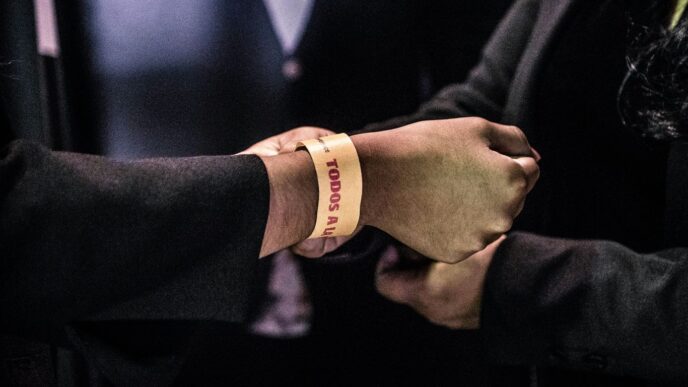Building strong connections takes effort, and sometimes, a few well-chosen words can make all the difference. This article explores some great building relationship quotes that highlight what it takes to create bonds that last. We’ll look at what makes relationships tick, from being honest to truly listening. Think of these as little reminders to help you be a better friend, partner, or family member. Because let’s be real, life’s a lot better when you have good people around you.
Key Takeaways
- Trust is the bedrock of any lasting connection; it’s built through consistent honesty and reliability.
- Empathy and active listening are vital for understanding and validating others’ feelings, deepening bonds.
- Being open and vulnerable allows for genuine connection, showing you value the relationship.
- Mutual respect for each other’s individuality is important, as is open communication to keep things clear.
- Shared experiences and generosity, given without expecting anything back, weave stronger ties over time.
1. The Foundation of Trust
You know, building a solid relationship isn’t really about grand gestures or constant excitement. It’s much more about the quiet, steady stuff that happens day-to-day. And at the very core of all that, you’ve got trust. Without it, things just don’t stick. Think of it like trying to build a house on sand – it looks okay for a bit, but eventually, it’s going to crumble. Trust is that bedrock. It’s the quiet confidence you have that someone has your back, that they’ll be honest with you, and that they won’t intentionally mess things up.
It’s not something you just wake up with in a relationship. Nope. You have to actively build it. It’s like tending a garden; you have to water it, pull the weeds, and give it sunlight. Over time, with consistent effort, it grows into something strong and reliable.
Here are a few things that really help build that trust:
- Showing up: This means being there when you say you will be. If you promise to help with something, do it. If you say you’ll call, make the call. It’s about being dependable.
- Being straight with people: Honesty, even when it’s tough, makes a huge difference. It shows you respect the other person enough to tell them the truth, not just what’s easy.
- Really listening: When someone talks to you, actually hear what they’re saying. Try to understand their feelings and what they’re going through. This shows you care about their experience.
When these things are in place, you create a safe space. It’s a place where people feel comfortable being themselves, sharing their thoughts, and knowing they won’t be judged or taken advantage of. That’s the real magic of trust.
2. Honesty: The Cornerstone of Connection
When you’re building any kind of lasting bond, honesty really is the bedrock. It’s not always easy, right? Sometimes the truth feels like it might cause a ripple, or maybe even a wave, that you’re not ready for. But here’s the thing: avoiding it, or worse, bending it, is like building your house on sand. Eventually, it’s going to crumble.
Think about it. When someone is consistently truthful with you, even when it’s tough, it shows they respect you. They’re not trying to shield you from reality or manipulate you into thinking a certain way. They’re giving you the real deal. This kind of straightforwardness builds a solid foundation of trust, which is pretty much everything in a relationship. It’s hard to feel truly connected to someone if you’re always second-guessing what they’re telling you. The impact of lies can be devastating, making it incredibly difficult to repair what’s broken [a655].
So, what does being honest actually look like in practice?
- Speaking your truth, kindly: This means sharing your thoughts and feelings openly, but with consideration for the other person’s feelings. It’s not about being blunt just for the sake of it.
- Admitting when you’re wrong: Nobody’s perfect. Owning up to mistakes, rather than making excuses, shows maturity and a commitment to the relationship.
- Being transparent about your intentions: If you’re working on something together or have a plan, being clear about what you’re doing and why helps prevent misunderstandings.
- Following through on your word: This ties into reliability, but it’s also about honesty. If you say you’ll do something, do it. If you can’t, communicate that honestly and as soon as possible.
Being honest isn’t just about avoiding lies; it’s about actively choosing transparency and integrity in your interactions. It’s a continuous effort, but the payoff – a relationship built on genuine trust – is absolutely worth it.
3. Reliability: Being There When It Matters

It’s easy to say you’ll be there for someone, but actually showing up? That’s the real test. Reliability isn’t just about keeping your word; it’s about being a steady presence in someone’s life. Think about it – when things get tough, who do you want by your side? Someone who makes promises and then disappears, or someone who you know will be there, no matter what?
Being reliable means your actions consistently match your words. It’s the quiet assurance that you can be counted on, day in and day out. This builds a deep sense of security and trust that’s hard to shake.
Here’s what being reliable looks like in practice:
- Showing Up: This means being present, both physically and emotionally, when you say you will be. It’s about punctuality and making an effort to be there for important moments, big or small.
- Following Through: If you commit to something, see it through. Whether it’s a small favor or a significant promise, completing what you start shows you respect the other person’s time and needs.
- Being Consistent: Reliability isn’t a one-time event. It’s about a pattern of dependable behavior. People need to know they can count on you over the long haul, not just when it’s convenient.
When you’re reliable, you’re not just a friend or partner; you’re a safe harbor. People feel more comfortable opening up and being themselves around you because they know you won’t suddenly vanish when they need support. It’s the bedrock upon which strong, lasting connections are built.
4. Empathy: Understanding Another’s Heart
It’s easy to get caught up in our own world, right? We all have our own stuff going on. But when it comes to building strong connections, really getting where someone else is coming from is a big deal. It’s about trying to see things from their point of view, even if it’s totally different from yours. This isn’t about agreeing with them, it’s about acknowledging their feelings and experiences.
Think about it: when you’re upset about something, and someone just listens, really listens, and tries to understand why you’re feeling that way? It makes a huge difference. It makes you feel seen and heard. That’s empathy in action.
Here are a few ways to practice empathy:
- Put yourself in their shoes: Imagine what it would be like to be them in that situation.
- Ask open-ended questions: Instead of "Are you okay?", try "How are you feeling about all this?"
- Validate their feelings: Say things like, "I can see why you’d be upset" or "That sounds really tough."
It takes practice, for sure. Sometimes we’re so quick to offer solutions or jump in with our own stories. But pausing to truly understand can be the most helpful thing you do. It builds a bridge between you and the other person, making the bond stronger. It’s a key part of building mutual trust and respect in any relationship.
5. Vulnerability: The Path to Genuine Connection
It sounds a little scary, right? Putting yourself out there, showing the messy bits, the parts you’re not so proud of. But honestly, that’s where the real magic happens in relationships. When you let someone see the imperfect you, the real you, it gives them permission to do the same.
Think about it. We all have those moments where we feel a bit lost, or unsure, or maybe even a little foolish. Instead of hiding that, what if you shared it? It’s not about complaining or seeking pity. It’s about saying, ‘Hey, this is me, flaws and all.’ This openness is what builds true closeness.
Here’s why it’s so important:
- It builds trust: When you’re open, you show you trust the other person. That trust often gets returned.
- It deepens intimacy: Sharing your inner world, your fears and hopes, creates a bond that surface-level chat just can’t touch.
- It encourages authenticity: When one person is vulnerable, it makes it safer for the other person to be real too. No more pretending.
It’s like taking off a mask. It might feel weird at first, but the relief and connection you feel afterward? Totally worth it. It’s the difference between a polite acquaintance and a friend you can really count on.
6. Mutual Respect: Valuing Each Other’s Uniqueness
It’s easy to fall into the trap of thinking we know what’s best for someone else, or that our way of doing things is the only right way. But healthy relationships are built on a bedrock of mutual respect. This means truly seeing and accepting the other person for who they are, not who we wish they were. It’s about appreciating their individual thoughts, feelings, and choices, even when they differ from our own.
Think about it: we’re all wired differently. We have unique backgrounds, experiences, and perspectives that shape how we navigate the world. Trying to force someone into a mold that doesn’t fit them is a recipe for frustration, for both of you. Instead, we should aim to create a space where both people feel seen and heard.
Here are a few ways to practice valuing each other’s uniqueness:
- Listen without judgment: When your partner or friend shares something, try to really hear them out. Put aside your own opinions for a moment and just absorb what they’re saying.
- Acknowledge differences: It’s okay to disagree. Instead of seeing differences as a problem, view them as opportunities to learn from each other.
- Support their passions: Even if you don’t share the same hobbies or interests, show genuine interest and support for what makes them light up.
- Give them space: Everyone needs their own time and space to recharge or pursue individual goals. Respecting this need is a sign of strong trust.
7. Open Communication: The Lifeline of Relationships
Think about it, relationships are kind of like plants, right? They need water and sunlight to grow. Well, in relationships, open communication is that water and sunlight. It’s how we keep things alive and healthy. When we don’t talk, or worse, when we talk but don’t really say what we mean, things start to wither. Assumptions creep in, and those are like weeds that can choke out all the good stuff.
The simple truth is, if you want people to really hear you, you have to be willing to hear them first. It sounds obvious, but it’s something we often forget. It means not just waiting for your turn to speak, but actually listening to understand where the other person is coming from. This isn’t always easy, especially when emotions are running high.
Here are a few things that really help keep the lines of communication open:
- Be honest, but kind: You can say what you need to say without being hurtful. It’s a balance, for sure.
- Talk about the small stuff: Don’t wait for a big problem to start talking. Chatting about your day, your worries, or even just what you had for lunch builds a habit of sharing.
- Check in regularly: Just a quick, "How are you doing?" or "What’s on your mind?" can make a big difference. It shows you care.
- Don’t be afraid to say you’re wrong: Nobody’s perfect. Admitting when you’ve messed up is a huge sign of strength and builds trust.
8. Shared Experiences: Weaving Bonds Through Time
Think about the people you feel closest to. Chances are, you’ve got a whole collection of memories with them, right? That’s because shared experiences are like the threads that weave a strong relationship together. It’s not just about being in the same place; it’s about going through things together, big or small.
These moments, whether it’s a hilarious road trip mishap, a quiet evening watching a storm, or even navigating a tough challenge, create a unique history between people. They give you inside jokes, shared understanding, and a sense of ‘we’ that’s hard to replicate any other way. These shared moments build a foundation of connection that can weather a lot.
It doesn’t always have to be grand adventures. Sometimes, the simplest things make the biggest difference:
- Trying a new recipe together and laughing at the results.
- Attending a local event or festival.
- Helping each other with a project, like moving or gardening.
- Simply having a regular coffee date to catch up.
These shared activities, over time, build a rich tapestry of memories. They remind you of the journey you’ve been on together and strengthen your bond. It’s about creating a shared narrative, a story that only the two of you (or the group) truly understand. This is how you build lasting connections, by actively creating and cherishing these shared moments. It’s a good idea to focus on encouragement rather than criticism in these times, as it fosters growth and strengthens connections.
When you look back on your life, it’s often these shared experiences that stand out. They’re the building blocks of deep, meaningful relationships.
9. Active Listening: Hearing Beyond the Words
It’s easy to think that talking is the main way we connect with people. We share our thoughts, our feelings, our stories. But what about the other side of that coin? What about really hearing what someone else is saying? That’s where active listening comes in, and honestly, it’s a game-changer for any relationship.
Active listening isn’t just about being quiet while someone else talks. It’s about being fully present, paying attention not just to the words, but to the tone, the body language, and what’s not being said. It’s about making the other person feel truly seen and understood. Think about it: when was the last time someone really listened to you, without interrupting or planning their own response? It feels pretty good, right?
Here’s what active listening really looks like:
- Pay Attention: Put away your phone, make eye contact (if that feels natural), and focus on the speaker. Try to clear your mind of distractions.
- Show You’re Listening: Nod, use small verbal cues like "uh-huh" or "I see," and lean in a bit. These little things signal that you’re engaged.
- Ask Clarifying Questions: If something is unclear, ask for more information. Phrases like "Can you tell me more about that?" or "So, if I understand correctly, you’re saying…" can be super helpful.
- Reflect and Summarize: Briefly restate what you heard in your own words. This confirms you understood and gives the speaker a chance to correct you if you didn’t.
- Avoid Interrupting: Let the person finish their thoughts before jumping in with your own. It shows respect for their perspective.
The most important part of active listening is making the other person feel heard and valued. It’s a skill that takes practice, but the payoff in stronger, more connected relationships is huge. It’s not about winning an argument or proving a point; it’s about building a bridge of understanding.
10. Generosity: Giving Without Expectation

Generosity in relationships isn’t just about big gestures; it’s often in the small, everyday things. It’s about offering your time, your attention, or a helping hand without needing something back right away. Think about it: when someone consistently shows up for you, not because they have to, but because they want to, that builds a really strong connection. It’s like planting seeds for future trust and goodwill.
True generosity means giving freely, without keeping score.
It’s easy to fall into a pattern of expecting something in return. You do this for me, so I should do that for you. But when you give without that expectation, it feels different. It shows you value the other person and the relationship itself. This kind of giving can show up in a few ways:
- Offering support: Being there when someone is going through a tough time, even if it’s inconvenient for you.
- Sharing resources: Whether it’s lending a tool, sharing a meal, or offering advice, it’s about contributing what you can.
- Giving your time: Actively listening, spending quality time together, or helping with a task without being asked.
When you practice this kind of giving, you’re not just helping the other person; you’re also strengthening the bond between you. It creates a positive cycle where kindness and support flow more naturally. It’s about building a relationship where both people feel cared for and appreciated, not because of a transaction, but because of genuine care.
Wrapping It Up
So, we’ve looked at a bunch of quotes about getting along with people and keeping those connections strong. It’s pretty clear that relationships aren’t just a nice-to-have; they’re a big part of what makes life good. Whether it’s being honest, really listening, or just showing up for someone, these little things add up. Remember, building something solid takes time and effort, but the payoff – those lasting bonds – is totally worth it. Don’t forget to take care of the connections that matter, and maybe share a quote or two with someone you care about.
Frequently Asked Questions
What’s the most important thing for a strong relationship?
The most important thing is trust. Without it, a relationship can’t really grow or last. Think of it like the foundation of a house – if it’s weak, the whole house can fall apart.
How can I show someone I’m reliable?
You show you’re reliable by doing what you say you’ll do. If you promise to help with something or be somewhere, make sure you follow through. Being dependable builds confidence in others.
Why is being honest so important, even if it’s tough?
Being honest, even when it’s difficult, shows that you respect the other person. It means you value their understanding more than avoiding a tough conversation. Honesty builds a strong base for trust.
What does empathy have to do with relationships?
Empathy is about understanding and sharing how someone else feels. When you show empathy, you’re telling the other person that you hear them and you care about their feelings. This makes connections much deeper.
Is it okay to be vulnerable with people?
Yes, being vulnerable is actually key to having real connections. It means letting your guard down and showing your true self. When you’re open, others feel they can be too, which creates genuine closeness.
How do shared experiences help relationships?
Doing things together, whether it’s fun activities or facing challenges, creates shared memories. These experiences act like threads that weave your lives together, making your bond stronger over time.














